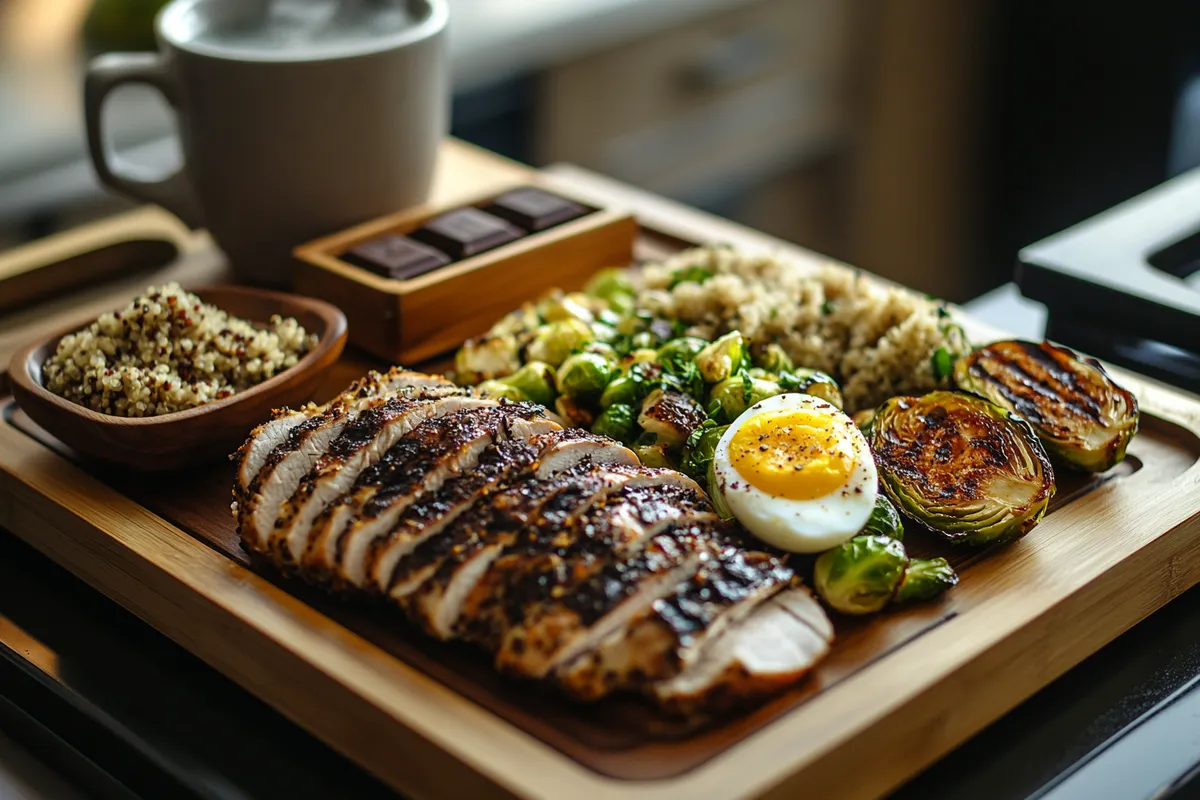Discover the essentials of a 1400-calorie diet and how it can support your health goals.
Understanding a 1400-Calorie Diet
A 1400-calorie diet is a structured eating plan designed to help individuals manage their weight. Essentially, it involves consuming 1400 calories each day, tailored to support weight loss or maintenance. Moreover, understanding what a 1400-calorie diet consists of ensures you receive balanced nutrition while staying within your calorie limit.
What Defines a 1400-Calorie Diet?
A 1400-calorie diet focuses on controlling daily calorie intake to create a calorie deficit, which promotes weight loss. Specifically, this diet requires careful planning to include nutrient-dense foods that provide essential vitamins and minerals. Consequently, it helps in achieving a healthy weight without compromising on nutrition.
Macronutrient Distribution in a 1400-Calorie Diet
Balancing macronutrients is crucial in a 1400-calorie diet. Generally, the distribution includes:
- Carbohydrates: 40%
- Proteins: 30%
- Fats: 30%
Additionally, this balance ensures sustained energy levels and supports bodily functions. Furthermore, adjusting these ratios can cater to individual health needs and preferences.
Carbohydrates: Fuel for Your Body
Carbohydrates are the body’s primary energy source. In a 1400-calorie diet, they account for 40% of daily intake. Therefore, focusing on complex carbs like whole grains, vegetables, and legumes is essential. For example:
- Whole Grains: Brown rice, quinoa, oats
- Vegetables: Broccoli, sweet potatoes, spinach
- Legumes: Lentils, chickpeas, black beans
By choosing these sources, you ensure a steady release of energy, preventing blood sugar spikes and crashes.
Proteins: Building Blocks of Health
Proteins play a vital role in muscle repair and growth. In this diet, they make up 30% of daily calories. Consequently, incorporating lean meats, dairy, and plant-based proteins is important. Examples include:
- Lean Meats: Chicken breast, turkey, lean beef
- Dairy: Greek yogurt, cottage cheese, low-fat milk
- Plant-Based: Tofu, tempeh, edamame
Furthermore, adequate protein intake supports satiety, helping you feel full longer and reducing overall calorie consumption.
Fats: Essential for Bodily Functions
Fats are crucial for hormone production and nutrient absorption. In a 1400-calorie diet, they constitute 30% of daily intake. Therefore, focusing on healthy fats is necessary. Recommended sources include:
- Avocados: Rich in monounsaturated fats and fiber
- Nuts and Seeds: Almonds, chia seeds, flaxseeds
- Healthy Oils: Olive oil, coconut oil, avocado oil
Additionally, these fats support heart health and cognitive function without adding excessive calories.
Essential Nutrients in a 1400-Calorie Diet
Ensuring adequate intake of essential nutrients is paramount in a 1400-calorie diet. Specifically, focus on vitamins and minerals to support overall health.
Vitamins and Minerals
Therefore, incorporate a variety of colorful fruits and vegetables to meet your micronutrient needs. Additionally, consider the following:
- Vitamin C: Citrus fruits, strawberries, bell peppers
- Calcium: Dairy products, fortified plant milks, leafy greens
- Iron: Lean meats, beans, fortified cereals
Moreover, these nutrients play key roles in immune function, bone health, and energy production.
Fiber: Promoting Digestive Health
Fiber is essential for digestive health and satiety. In a 1400-calorie diet, aim for at least 25 grams of fiber daily. Consequently, include high-fiber foods such as:
- Whole Grains: Oats, barley, quinoa
- Fruits: Apples, pears, berries
- Vegetables: Broccoli, Brussels sprouts, carrots
Furthermore, fiber helps regulate blood sugar levels and supports a healthy digestive system.
Hydration: Staying Well-Hydrated
Adequate hydration is often overlooked but is crucial in a 1400-calorie diet. Therefore, aim to drink at least 8 glasses of water each day. Additionally, hydrating beverages include:
- Water: The best choice for hydration
- Herbal Teas: Caffeine-free options like chamomile or peppermint
- Infused Water: Add fruits or herbs for flavor without extra calories
By staying hydrated, you support metabolism, digestion, and overall health.
Sample Meal Plans
Creating a balanced meal plan is essential in a 1400-calorie diet. Here’s a sample plan to guide you through the day.
Breakfast
- Oatmeal with Berries and Almonds
- Carbohydrates: 1 cup of cooked oatmeal
- Proteins: 2 tablespoons of almond butter
- Fats: 1 ounce of almonds
- Greek Yogurt
- Carbohydrates: Fresh berries
- Proteins: 1 cup of Greek yogurt
- Fats: Drizzle of honey
Mid-Morning Snack
- Protein Smoothie
- Carbohydrates: 1 banana
- Proteins: 1 scoop of protein powder
- Fats: 1 tablespoon of flaxseeds
Lunch
- Grilled Chicken Salad
- Carbohydrates: Mixed greens, cherry tomatoes, cucumbers
- Proteins: 6 ounces of grilled chicken breast
- Fats: 2 tablespoons of olive oil-based dressing
- Quinoa
- Carbohydrates: 1 cup of cooked quinoa
Afternoon Snack
- Hummus and Veggie Sticks
- Carbohydrates: Carrot and celery sticks
- Proteins: 1/4 cup of hummus
- Fats: Olive oil in hummus
Dinner
- Baked Salmon with Sweet Potatoes and Asparagus
- Carbohydrates: 1 medium sweet potato
- Proteins: 6 ounces of baked salmon
- Fats: 1 tablespoon of olive oil
- Steamed Asparagus
- Carbohydrates: Asparagus spears
- Proteins: Minimal
- Fats: Drizzle of lemon juice and olive oil
Evening Snack
- Cottage Cheese with Pineapple
- Carbohydrates: Pineapple chunks
- Proteins: 1 cup of cottage cheese
- Fats: Minimal
This sample meal plan ensures a balanced intake of carbohydrates, proteins, and fats, aligning with the 1400-calorie diet guidelines.
Benefits of a 1400-Calorie Diet
Adopting a 1400-calorie diet offers numerous health benefits. Specifically, it supports weight loss, enhances metabolic health, and promotes overall well-being.
Weight Loss and Management
Consequently, a 1400-calorie diet creates a calorie deficit, leading to weight loss. Additionally, it helps in maintaining a healthy weight by preventing overeating. Furthermore, the balanced macronutrient distribution supports sustained weight management.
Improved Metabolic Health
Therefore, this diet can improve metabolic markers such as blood sugar levels and cholesterol. Additionally, it reduces the risk of chronic diseases like diabetes and heart disease. Moreover, maintaining a balanced diet supports efficient metabolic function.
Enhanced Energy Levels
Furthermore, a 1400-calorie diet provides sufficient energy for daily activities. By balancing carbohydrates, proteins, and fats, it ensures steady energy throughout the day. Thus, you can maintain productivity and avoid energy crashes.
Better Digestive Health
Additionally, the high fiber content in this diet promotes healthy digestion. Moreover, it prevents constipation and supports a healthy gut microbiome. Consequently, you experience better digestive comfort and regularity.
Increased Nutrient Intake
Furthermore, focusing on nutrient-dense foods ensures adequate intake of essential vitamins and minerals. Specifically, it supports immune function, bone health, and overall vitality. As a result, you maintain optimal health while managing calorie intake.
Potential Challenges and Solutions
While a 1400-calorie diet is effective, some may encounter challenges. However, with the right strategies, these obstacles can be overcome.
Hunger and Cravings
Problem: Feeling hungry or experiencing cravings.
Solution: Incorporate high-fiber and high-protein foods to enhance satiety. Additionally, drink plenty of water and include healthy fats to keep you full longer. Furthermore, eating smaller, frequent meals can help manage hunger.
Nutrient Deficiencies
Problem: Risk of missing essential nutrients.
Solution: Focus on nutrient-dense foods and include a variety of fruits, vegetables, lean proteins, and whole grains. Additionally, consider taking a multivitamin supplement after consulting with a healthcare provider. Moreover, planning meals carefully ensures balanced nutrient intake.
Social Situations and Eating Out
Problem: Difficulty adhering to the diet during social events or dining out.
Solution: Plan ahead by checking restaurant menus and making informed choices. Additionally, communicate your dietary needs to hosts and bring your own snacks if necessary. Furthermore, prioritize balanced meal options that fit within your calorie goals.
Time Constraints for Meal Preparation
Problem: Limited time for preparing meals.
Solution: Utilize meal prepping techniques by preparing meals in bulk during weekends. Additionally, choose simple recipes that require minimal preparation. Furthermore, invest in kitchen gadgets like slow cookers or instant pots to save time.
Maintaining Motivation and Consistency
Problem: Struggling to stay motivated.
Solution: Set realistic goals and track your progress regularly. Additionally, seek support from friends, family, or online communities. Moreover, celebrate small victories to stay encouraged.
Tips for Success on a 1400-Calorie Diet
Implementing a 1400-calorie diet successfully requires dedication and strategic planning. Here are some actionable tips to help you stay on track and maximize the benefits of this diet.
Meal Planning and Preparation
Therefore, plan your meals in advance to ensure you stay within your calorie limit. Additionally, prepare meals ahead of time to avoid last-minute unhealthy choices. Consequently, meal prepping saves time and reduces the temptation to overeat.
Use Measuring Tools
Moreover, use measuring cups, food scales, or portion control plates to maintain accurate serving sizes. This ensures you consume the right amount of calories without overeating. Thus, portion control is crucial in a 1400-calorie diet.
Focus on Whole, Unprocessed Foods
Furthermore, prioritize whole foods over processed options. Specifically, choose fresh vegetables, lean proteins, and whole grains. Additionally, these foods are typically more nutrient-dense and satisfying, supporting your health goals.
Stay Hydrated
Consequently, drink plenty of water throughout the day. Additionally, staying hydrated can help control hunger and improve metabolism. Moreover, opt for water, herbal teas, or infused water to avoid unnecessary calories from sugary drinks.
Incorporate Physical Activity
Therefore, combine your diet with regular exercise to enhance weight loss and improve overall health. Additionally, activities like walking, cycling, or strength training can boost your calorie expenditure. Furthermore, exercise supports muscle maintenance and metabolic health.
Monitor Your Progress
Thus, keep track of your weight loss and how you feel on the diet. Additionally, use a journal or mobile app to log your meals and monitor your calorie intake. Consequently, tracking progress helps you stay motivated and make necessary adjustments.
Seek Professional Guidance
Furthermore, consult with a registered dietitian or nutritionist to create a personalized meal plan. Additionally, professionals can provide support and address any dietary concerns. Moreover, personalized guidance ensures you meet your nutritional needs effectively.
Frequently Asked Questions
Is 1400 calories realistic?
Absolutely, a 1400-calorie diet can be realistic and effective for weight loss or maintenance, depending on individual needs and activity levels. It’s important to ensure that even with a lower calorie intake, the diet remains balanced and provides all necessary nutrients. Therefore, consulting with a healthcare provider before starting a 1400-calorie diet is recommended to ensure it aligns with your personal health goals and requirements.
How to stay full on 1400 calories a day?
To stay full on 1400 calories, focus on high-fiber foods, lean proteins, and healthy fats. Additionally, incorporate plenty of vegetables and whole grains to maintain satiety. Strategies include:
- Eating Fiber-Rich Foods: Vegetables, fruits, and whole grains can help you feel fuller longer
- Including Protein in Every Meal: Protein promotes satiety and reduces overall hunger
- Choosing Healthy Fats: Avocados, nuts, and olive oil can help keep you satisfied between meals
Moreover, drinking plenty of water and spacing meals evenly throughout the day can help manage hunger effectively.
What is a 40 40 20 meal plan?
A 40 40 20 meal plan divides daily calories into 40% carbohydrates, 40% proteins, and 20% fats, ensuring balanced nutrition and supporting overall health. This meal plan is designed to provide a structured approach to eating, promoting a sustainable and flexible diet that can be tailored to individual needs and preferences.
Conclusion
A 1400-calorie diet consists of carefully balanced meals that provide essential nutrients while maintaining a calorie deficit for weight management. By focusing on whole foods, proper macronutrient distribution, and strategic meal planning, you can achieve your health goals effectively. Ultimately, this diet promotes sustainable eating habits and overall well-being.



